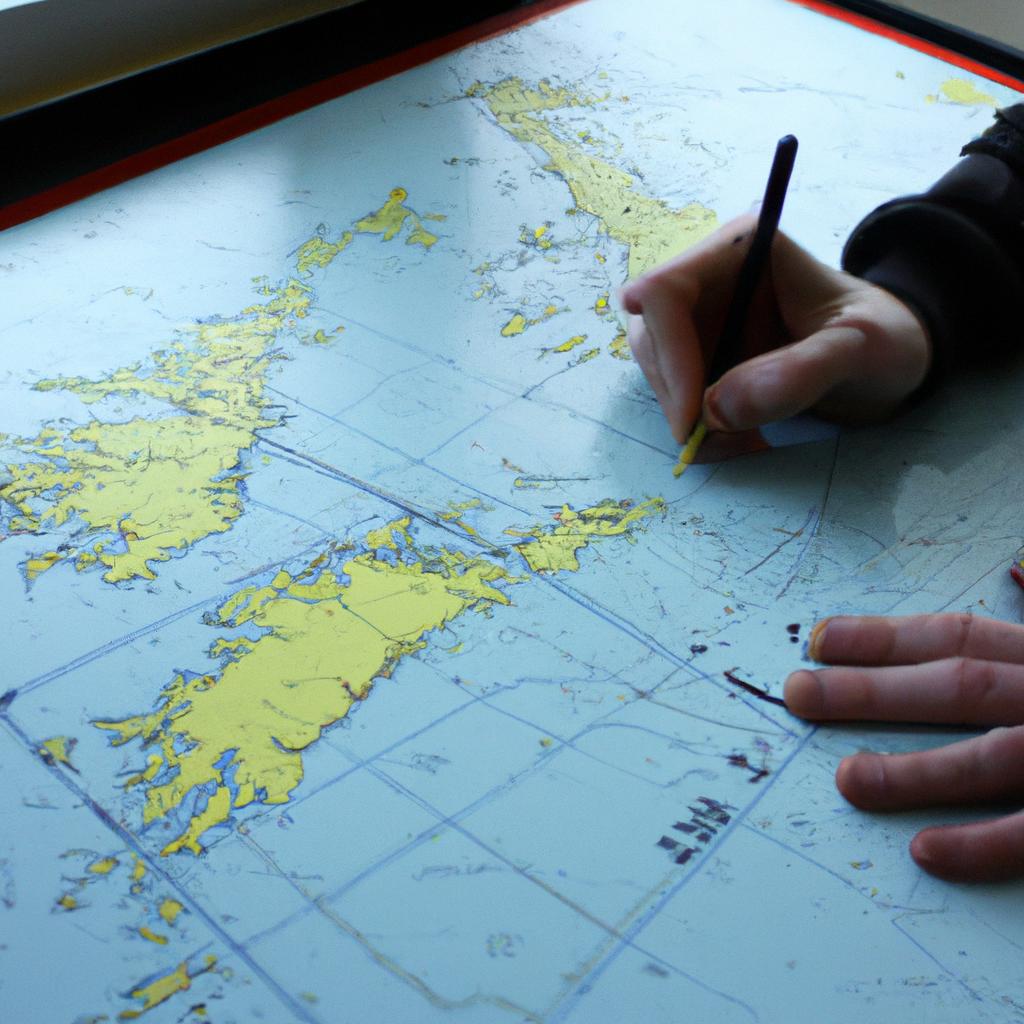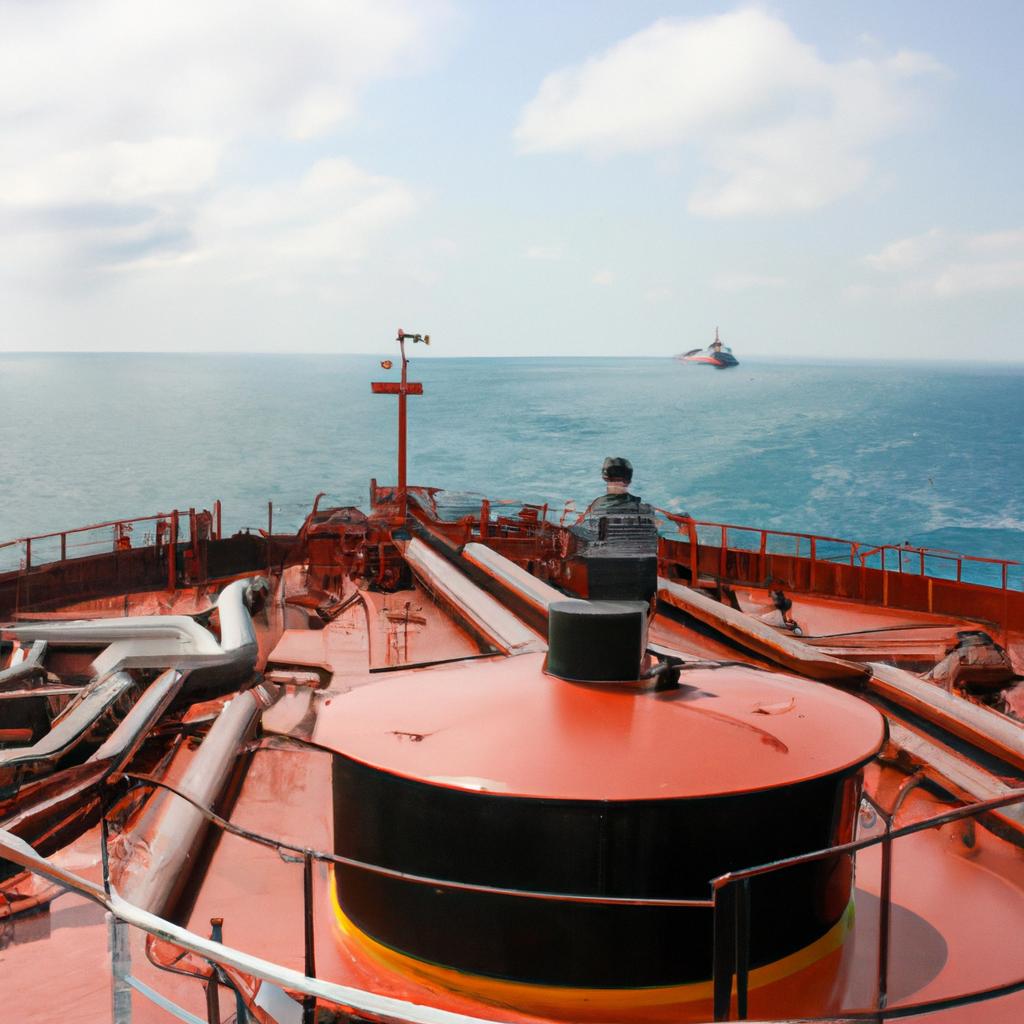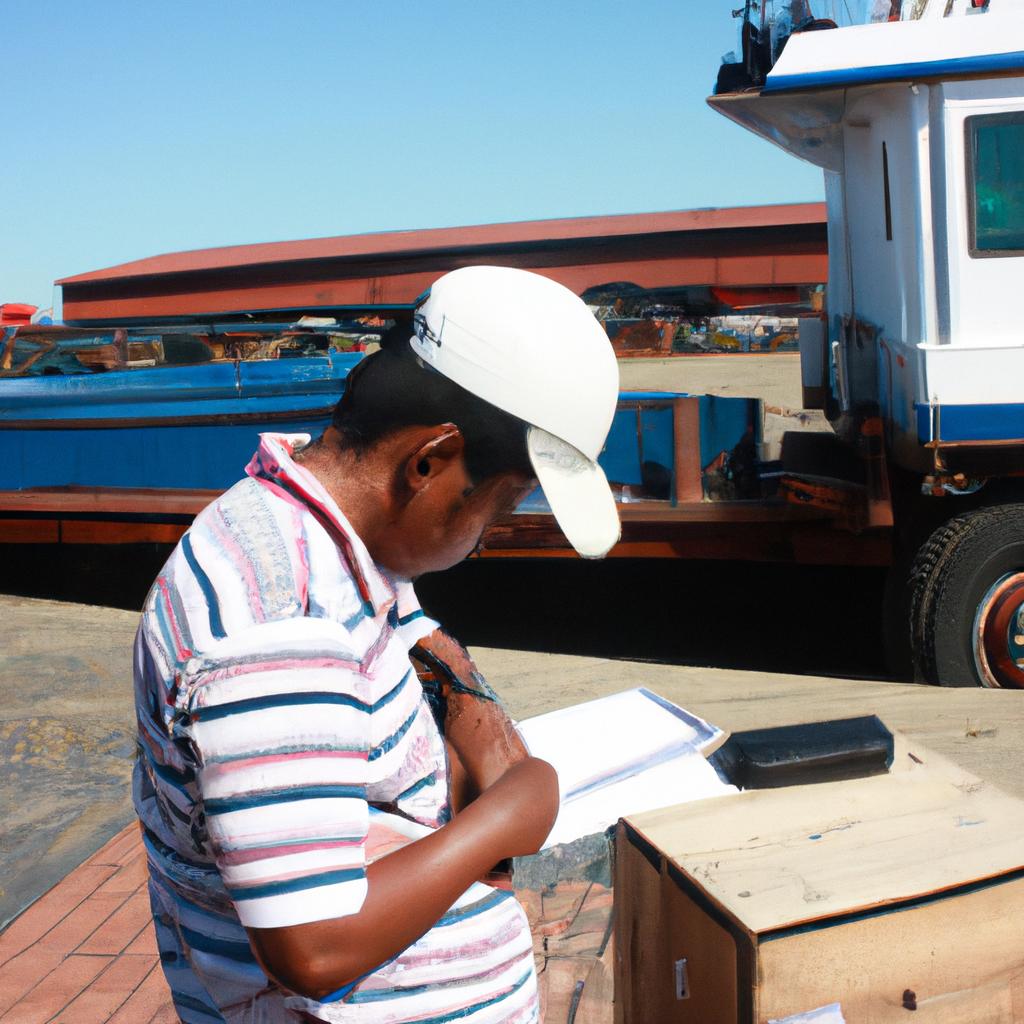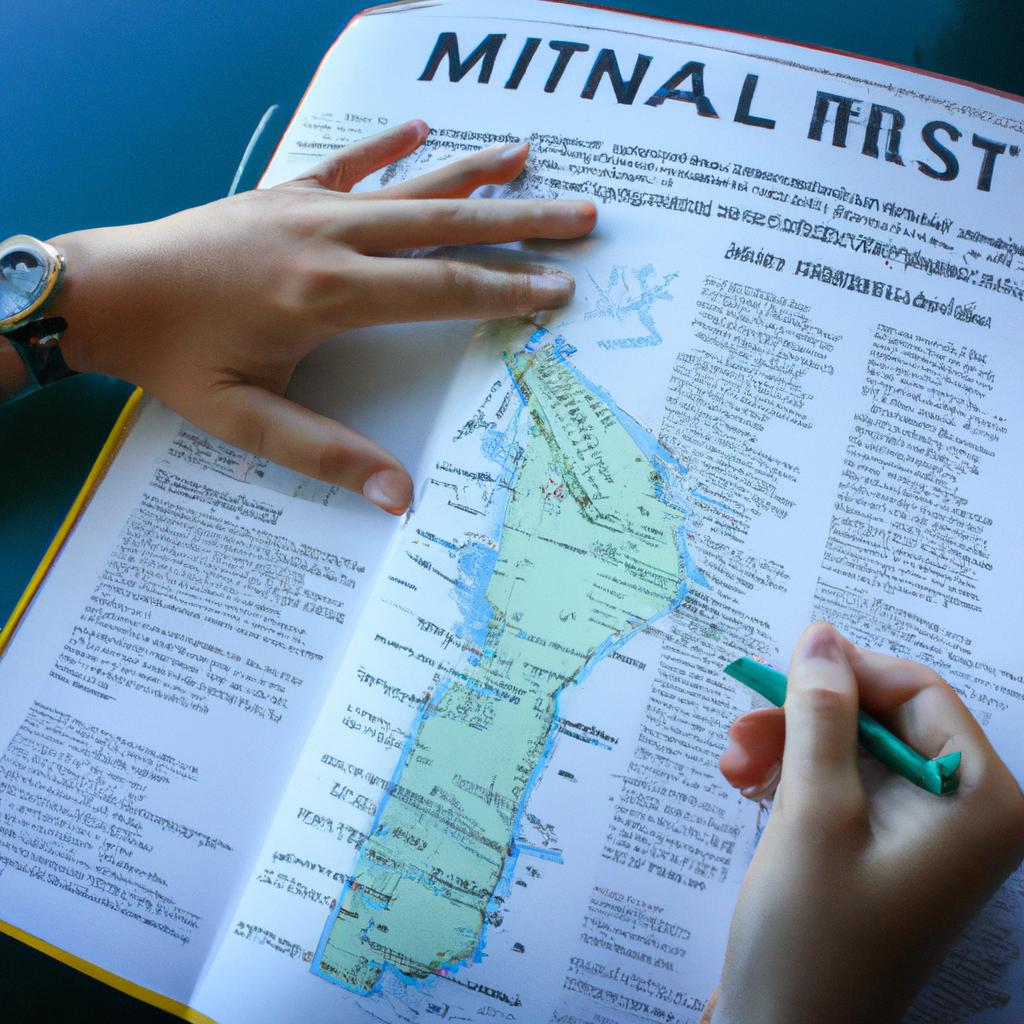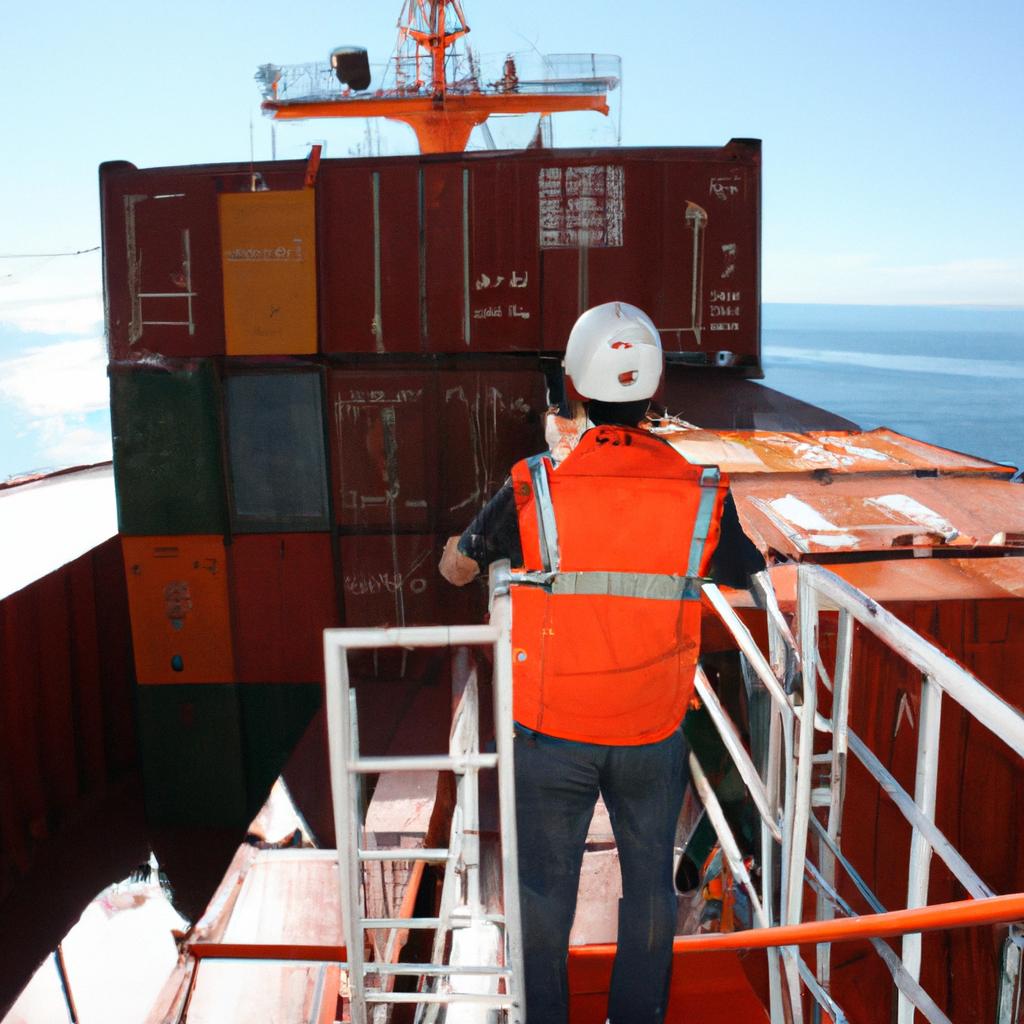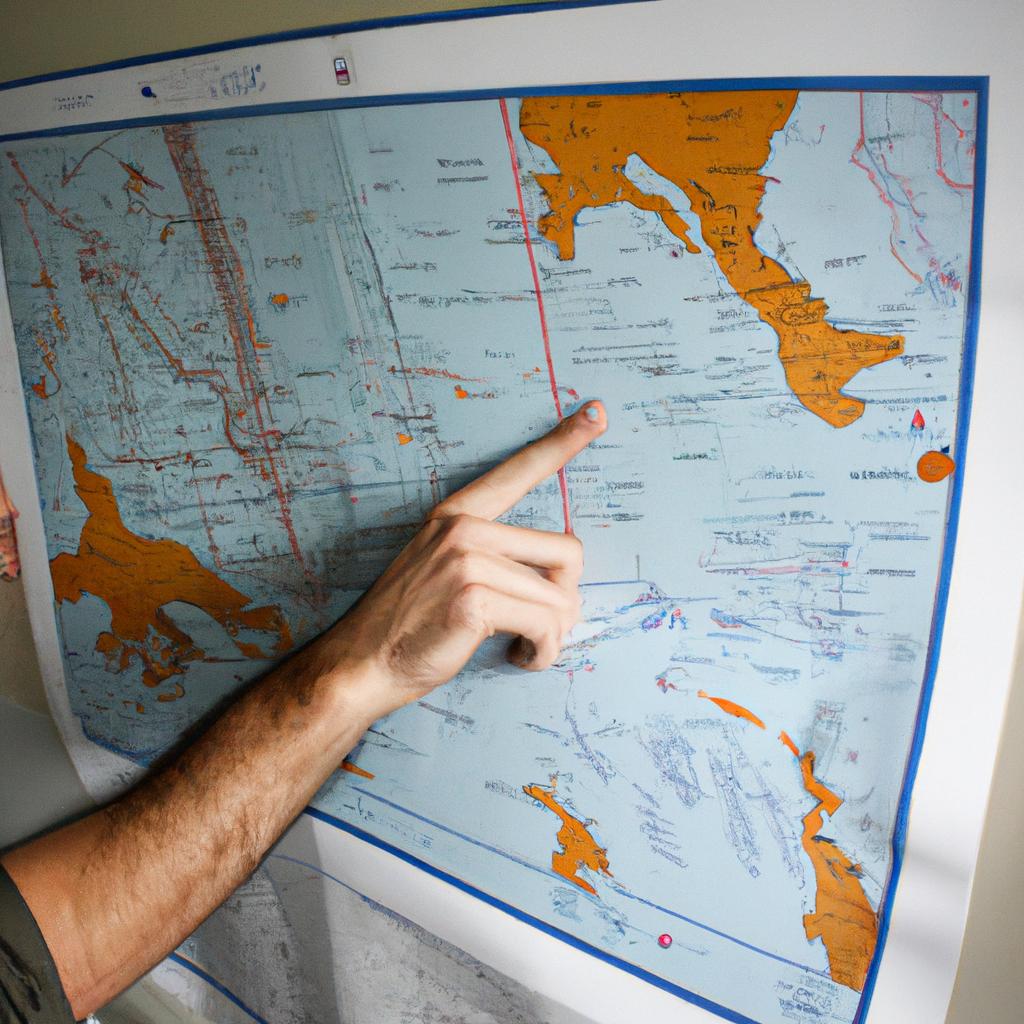Shipping regulations play a critical role in regulating the transport and freight rates of goods, particularly in regions with prominent waterways such as the Black Sea. The Black Sea is known for its significant contributions to international trade, making it essential to have stringent shipping regulations governing this area. Failure to adhere to these regulations can result in various consequences, including environmental damage, economic loss, and compromised safety. To illustrate the importance of these regulations, let us consider a hypothetical scenario where a cargo ship fails to comply with the prescribed guidelines.
Imagine a bustling port on the shores of the Black Sea, where numerous vessels are docked for loading and unloading goods. Among them is a large cargo ship carrying hazardous materials without proper documentation or following safety protocols. As night falls upon the port city, an unfortunate incident occurs – due to insufficient regulation compliance, there is a leakage from one of the containers holding toxic chemicals into the sea waters. This mishap not only poses immediate risks to human health and marine life but also triggers long-term ecological repercussions that impact both local communities and neighboring countries. Such scenarios emphasize why robust shipping regulations are indispensable when it comes to safeguarding maritime activities within the region and maintaining sustainable transportation practices overall.
Overview of Shipping Regulations in the Black Sea region
The Black Sea region has a complex network of shipping regulations that govern the transportation and freight rates within its waters. These regulations are crucial for ensuring smooth and efficient operations, as well as promoting fair competition among shipping companies. To understand these regulations better, let us consider an example: a hypothetical scenario where a company based in Istanbul intends to ship goods to Odessa.
Firstly, it is essential to comprehend the role of regulatory bodies such as the International Maritime Organization (IMO) and national maritime authorities. The IMO sets international standards for safety, security, and environmental performance in shipping. National maritime authorities enforce these standards at the regional level by implementing their own specific regulations. For instance, Turkey’s Directorate General of Coastal Safety oversees navigational safety along its coastlines.
In terms of specific regulations applicable to the Black Sea region, there are several key factors that influence transport operations:
- Port infrastructure: The availability of modern port facilities directly impacts cargo handling efficiency and turnaround times.
- Customs procedures: Streamlined customs processes reduce delays and facilitate smoother movement of goods across borders.
- Security measures: Stringent security protocols ensure the protection of vessels, crew members, and cargoes from potential threats.
- Freight rates: Competitive pricing plays a significant role in determining which shipping lines dominate certain trade routes.
To provide a visual representation of these factors, consider the following table:
| Factors | Description | Importance |
|---|---|---|
| Port Infrastructure | Modern facilities for efficient cargo handling | High |
| Customs Procedures | Streamlined processes for seamless border crossings | Medium |
| Security Measures | Stringent protocols ensuring vessel and cargo protection | High |
| Freight Rates | Competitive pricing for market dominance | High |
Considering these influential factors allows stakeholders—such as shippers, consignees, and shipping lines—to better navigate the intricate web of regulations governing Black Sea transport. In the subsequent section, we will delve deeper into key factors that shape these transport regulations.
Key factors influencing transport regulations in the Black Sea region
[Write transition sentence here]
Key factors influencing transport regulations in the Black Sea
Shipping Regulations: Black Sea Transport and Freight Rates
Overview of Shipping Regulations in the Black Sea Region
The Black Sea region has long been an important hub for international trade, with its strategic location connecting Europe, Asia, and the Middle East. As such, shipping regulations play a crucial role in ensuring efficient and safe transportation of goods across this vast waterway. To better understand the impact of these regulations, let us consider a hypothetical case study.
Imagine a cargo ship departing from Istanbul, Turkey, carrying valuable goods destined for Odessa, Ukraine. The journey involves navigating through multiple countries within the Black Sea region, each with their own distinct set of shipping regulations. These regulations encompass various aspects such as customs procedures, documentation requirements, safety standards, and port operations.
One key factor influencing transport regulations in the Black Sea is geopolitical dynamics. Due to historical tensions and ongoing conflicts in certain areas surrounding the sea, there may be additional security measures imposed on vessels passing through those regions. These measures could include increased inspections or even restrictions on navigation routes. Furthermore, political stability plays a significant role in determining the consistency and predictability of regulatory frameworks.
- Delays caused by stringent customs procedures can lead to financial losses for companies.
- Inconsistent safety standards increase the risk of accidents and environmental damage.
- Unclear documentation requirements create confusion among shippers and freight forwarders.
- High port fees can significantly raise transportation costs for businesses operating in the area.
Additionally, it is essential to recognize how different countries’ shipping regulations vary within this region. A three-column table further illustrates some contrasting features between two major ports along the Black Sea coast:
| Port A | Port B | |
|---|---|---|
| Customs | Streamlined process | Complex documentation |
| Safety Standards | Stringent | Relaxed |
| Port Fees | Low | High |
Understanding the legal framework for shipping in the Black Sea region is crucial to ensure smooth operations and minimize disruptions. In the subsequent section, we will delve into the various laws and international agreements that shape these regulations, providing a comprehensive overview of the legal landscape governing maritime activities.
[Transition sentence] By examining the legal framework, we can gain valuable insights into how shipping regulations are established and enforced across countries in the Black Sea region. Understanding this foundation enables stakeholders to navigate the complexities of transporting goods through these waters effectively.
Understanding the legal framework for shipping in the Black Sea
Key Factors Influencing Transport Regulations in the Black Sea
The implementation of transport regulations in the Black Sea region is influenced by several key factors that shape the legal framework governing shipping activities. To illustrate this, let us consider a hypothetical case study involving a shipping company, Oceanic Freighters Ltd., which operates vessels transporting goods across countries surrounding the Black Sea.
Firstly, geographical considerations play a crucial role in determining transport regulations. The unique geography of the Black Sea, with its diverse coastlines and various ports, necessitates different rules and requirements for safe navigation and efficient cargo handling. For instance, varying water depths along certain routes may require specific vessel specifications or navigational aids to ensure maritime safety.
Secondly, geopolitical dynamics significantly impact regulatory frameworks. Given that multiple countries bordering the Black Sea have jurisdiction over their respective territorial waters, there is a need for coordination and cooperation among these nations to harmonize shipping regulations. Bilateral agreements and international conventions are often employed to achieve uniformity in areas such as customs procedures, immigration control, environmental protection measures, and port state control inspections.
Thirdly, economic factors heavily influence transport regulations in the region. As trade volumes increase between European Union (EU) member states and non-EU countries through the Black Sea ports, it becomes essential to align regulations with EU standards while also accounting for local economies’ specific needs. This delicate balance ensures fair competition among market players while promoting sustainable growth.
To evoke an emotional response from readers about how these factors affect shipping companies operating in the Black Sea region:
- Increased bureaucratic hurdles can lead to delays in cargo clearance at ports.
- Inconsistent enforcement of regulations by different authorities can create uncertainty for businesses.
- Financial implications arising from compliance costs can impact profit margins.
- Environmental concerns due to inadequate regulation may harm marine ecosystems.
A table exemplifying these challenges could be presented as follows:
| Challenges Faced by Shipping Companies | Emotional Response |
|---|---|
| Delays in cargo clearance | Frustration |
| Uncertainty due to inconsistent enforcement | Anxiety |
| Financial implications of compliance costs | Concern |
| Environmental harm | Alarm |
In conclusion, the implementation of transport regulations in the Black Sea region is influenced by various factors such as geography, geopolitics, and economics. These factors shape the legal framework governing shipping activities and have a direct impact on shipping companies’ operations. Understanding these key influences is essential for businesses seeking to navigate the complex regulatory landscape successfully.
[Transition sentence into subsequent section about “Challenges faced by shipping companies in complying with Black Sea regulations”] Consequently, shipping companies face numerous challenges when striving to comply with the diverse set of regulations governing their operations in the Black Sea region.
Challenges faced by shipping companies in complying with Black Sea regulations
Understanding the legal framework for shipping in the Black Sea is crucial for companies operating in this region. Compliance with regulations ensures smooth operations and helps avoid penalties or other legal consequences. To illustrate the importance of adhering to these regulations, let’s consider a hypothetical case study involving a shipping company that neglected to comply.
In this scenario, Company X failed to fulfill its obligations under the Black Sea shipping regulations. As a result, they faced significant challenges and incurred substantial financial losses. The case highlights some common issues encountered by shipping companies when compliance is not prioritized:
- Penalties and Fines: Non-compliance with Black Sea shipping regulations can lead to hefty fines imposed by regulatory authorities. These penalties are designed to enforce adherence to safety standards, environmental protection measures, and fair business practices.
- Operational Disruptions: Failure to comply with regulations may result in operational disruptions such as delayed shipments or even vessel detentions until necessary requirements are met. This can impact customer satisfaction and overall profitability.
- Reputational Damage: Companies that consistently fail to meet regulatory standards risk damaging their reputation within the industry. Negative publicity can deter potential customers from engaging their services, leading to loss of business opportunities.
- Legal Consequences: In extreme cases of non-compliance, legal actions including lawsuits may be initiated against offending companies, further exacerbating their financial burdens.
To emphasize the significance of complying with Black Sea shipping regulations, let us now explore an emotional response through both bullet points and a table:
- Adherence: Ensuring compliance safeguards lives at sea while protecting marine ecosystems.
- Efficiency: Complying with regulations enhances operational efficiency, reducing delays and ensuring timely delivery of goods.
- Reputation: Maintaining compliance builds trust among stakeholders and strengthens the company’s reputation in the market.
- Sustainability: Adhering to environmental regulations promotes sustainable maritime practices.
| Compliance Benefits | Emotional Impact |
|---|---|
| Safeguarding lives and ecosystems | Protection and care for the environment and human welfare |
| Enhancing operational efficiency | Confidence in timely delivery of goods |
| Building trust and a strong reputation | Assurance and reliability for customers |
| Promoting sustainable practices | Contributing to a greener future |
Understanding the implications of non-compliance with Black Sea shipping regulations is essential for companies operating in this region. By prioritizing compliance, businesses can avoid penalties, maintain smooth operations, protect their reputation, and contribute to sustainable maritime practices.
Implications of non-compliance with Black Sea shipping regulations
Challenges faced by shipping companies in complying with Black Sea regulations can have significant implications on their operations and overall success. To further understand the impact of non-compliance, let’s consider a hypothetical case study involving a shipping company navigating the Black Sea.
In this scenario, Company X failed to adhere to certain regulations governing fuel emissions while operating within the Black Sea region. As a result, they were subjected to heavy penalties and fines imposed by regulatory bodies. This case highlights the importance of compliance with Black Sea shipping regulations and underlines the potential consequences that non-compliance can bring.
Non-compliance with Black Sea shipping regulations has several implications for both shippers and carriers alike:
-
Financial repercussions: Companies found in violation of these regulations may face substantial financial penalties, which can significantly affect their bottom line. These fines could range from monetary sanctions to loss of business opportunities due to damaged reputation.
-
Legal ramifications: Non-compliance can lead to legal action initiated by regulatory authorities or affected parties seeking compensation. Litigation processes can be time-consuming, costly, and detrimental to a company’s image and resources.
-
Operational disruptions: Failure to comply with Black Sea shipping regulations may result in delays or even temporary suspensions of operations. Compliance-related inspections and audits conducted by enforcement agencies can interrupt normal business activities and cause logistical challenges for companies involved in maritime transport.
-
Reputational damage: Non-compliant actions not only harm a company’s finances but also tarnish its reputation within the industry. Negative publicity resulting from violations could deter potential customers, partners, investors, leading to long-term damage to market positioning.
To emphasize the significance of these implications visually, we present a table showcasing key effects of non-compliance:
| Implications | Description |
|---|---|
| Financial Loss | Heavy fines impacting profit margins |
| Legal Proceedings | Potential lawsuits demanding compensations |
| Operational Delays | Disruptions in operations leading to delays |
| Reputational Damage | Negative impact on company image and customer trust |
In summary, non-compliance with Black Sea shipping regulations can have far-reaching consequences for companies operating within the region. Financial penalties, legal actions, operational disruptions, and reputational damage are some of the potential outcomes that businesses must be mindful of to ensure their sustainability.
Looking ahead, it is crucial to explore emerging trends and future outlooks for the Black Sea transport industry as this knowledge will help stakeholders navigate regulatory challenges more effectively.
Emerging trends and future outlook for Black Sea transport industry
Section 2: Implications of Non-compliance with Black Sea Shipping Regulations
Having examined the importance of compliance with Black Sea shipping regulations, it is crucial to understand the implications that arise when these regulations are not followed. This section will delve into the potential consequences faced by individuals and companies who fail to comply with these regulations, highlighting both economic and environmental impacts.
Case study example:
Consider a hypothetical scenario where Company X decides to bypass certain safety protocols mandated by Black Sea shipping regulations in order to expedite their operations. As a result, they unknowingly load hazardous materials onto a vessel without proper documentation or adherence to safety standards. During transit, an accident occurs, leading to a spillage of toxic substances into the sea waters. The consequences of this non-compliance can be dire for multiple stakeholders involved.
Implications of non-compliance:
-
Economic repercussions:
- Increased insurance premiums due to higher risk profiles.
- Legal penalties and fines imposed on non-compliant entities.
- Loss of business opportunities as customers prioritize compliant partners.
- Decline in investor confidence resulting in limited access to capital markets.
-
Environmental damage:
- Contamination of marine ecosystems, affecting aquatic life and biodiversity.
- Long-term ecological consequences impacting local communities dependent on maritime resources.
- Negative public perception towards non-compliant entities leading to reputational damage.
-
Threats to human health and safety:
- Exposure to hazardous materials causing severe health risks for workers involved in transportation activities.
- Potential accidents leading to injuries or loss of life among crew members and nearby populations.
Table: Comparison between Compliant vs. Non-Compliant Entities
| Aspect | Compliant Entities | Non-Compliant Entities |
|---|---|---|
| Financial Impact | Stable financial standing | Increased costs and legal penalties |
| Environmental | Minimal ecological damage | Long-term environmental consequences |
| Responsibility | Ethical reputation | Negative public perception |
| Safety Standards | Prioritize crew safety | Higher risk of accidents and injuries |
In summary, non-compliance with Black Sea shipping regulations can have severe implications for individuals and companies involved in maritime transportation. This section highlighted the economic repercussions faced by non-compliant entities, along with the potential environmental damage caused by neglecting safety protocols. Moreover, threats to human health and safety underscore the need for strict adherence to these regulations. It is evident that compliance not only preserves the integrity of the industry but also ensures a sustainable future for all stakeholders involved.




